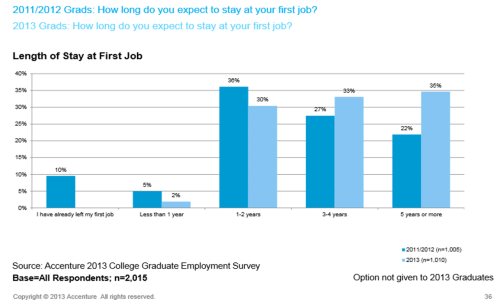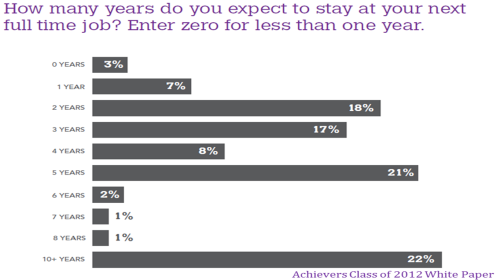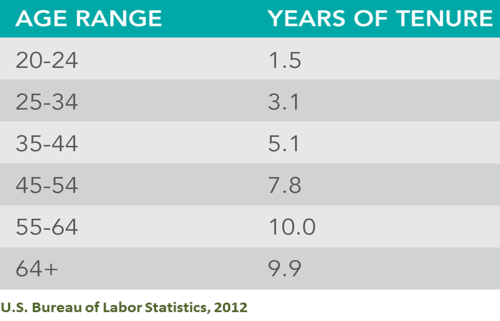Accenture recently published its 2013 College Graduate Employment Survey findings.
There’s lots of great data — especially if you plan to hire recent college grads. In fact, some of the data is surprising.
One of the important takeaways is that employers have unrealistic expectations for the skills of the hires they make out of college. They think these young people should be able to hit the ground running and are surprised and disappointed when they don’t.
And to compound the problem, these employers are not investing in training initiatives to get the newly hired up to speed in the short term or effective in the long term.
Young workers? They’re ready to commit
This is all pretty logical. It’s good data and if you plan on hiring entry level employees from the ranks of the newly graduated, you should read this.
But here’s what caught my attention: It’s about the willingness to commit. And it isn’t the first time I’ve seen data like this.
Young people, entering the economy for the first time, want to commit to their employers. It’s not what we expect, I know. We expect these youngsters to be gone in the career equivalent of 60 seconds. And sometimes they are.
But, it’s important to know that that isn’t what they want! This isn’t what they expect!
From Accenture: The class of 2013 is expecting more career longevity from their first jobs: 68 percent of pending 2013 college grads expect to be at their first job more than three (3) years compared to 49 percent of 2011/2012 college grads.
And this is from the Achievers Class of 2012 white paper:
Some surprising — and unexpected — findings
In this survey, more than 70 percent of 2012 college graduates expected to be with their first/next employer three (3) years or longer — and 48 percent expected to be with their first/next employer five (5) years or more.
Surprising, right? Not what we expect, right? Not what we “know” about Gen Y/Millennials, right?
But the Bureau of Labor Statistics (BLS) shows us what happens once they join our organizations:
What happens when job disappointment sets in?
So, young people entering the economy for the first time with a newly minted degree are filled with optimism and have every intention of committing to their first employer for five years or more. Is it naivete or is it a real desire to commit, belong and make a difference?
And what happens once they start that first job that compels them to hit the door in 18 months or less? Are employers so inept at selection that they really can’t hire employees that will persist? Are young people so naïve that they don’t really know what they’re signing up for and leave when reality doesn’t match expectations?
Or, as the Accenture survey suggests, are young people disappointed when expected training and development doesn’t materialize and they leave in search of greater learning opportunities?
Clearly this is a complex issue with lots of dynamics, as the Accenture survey results show. However, if we started with the belief and understanding that young people really do want to engage and commit to their employer, would we be more likely to invest in developing their skills?
If we started with the belief and understanding that young people really do want to engage and commit to their employer, would we create onboarding processes that ensure expectations – on both sides – are being understood and met?
Gen Y stereotypes may fuel a self-fulfilling prophecy
If we started with the belief and understanding that young people really do want to engage and commit to their employer, how would we approach them differently?
I suspect that most employers believe that there’s no return in investing in a talent pool that will be gone in 60 seconds.
I further suspect that the EVP (employee value proposition) that is sold in the recruiting process doesn’t exactly come to life once the recruit joins the organization.
But I also suspect that the real issue is that Gen X and Baby Boomer managers, supervisors and recruiters believe all the negative stereotypes about Gen Y and their lack of commitment to any agendas other than their own — despite multiple data sources that show just the opposite.
And, we’ve ended up in this tough reality that has become a full-fledged self-fulfilling prophecy.
This originally appeared on China Gorman’s blog at ChinaGorman.com.
